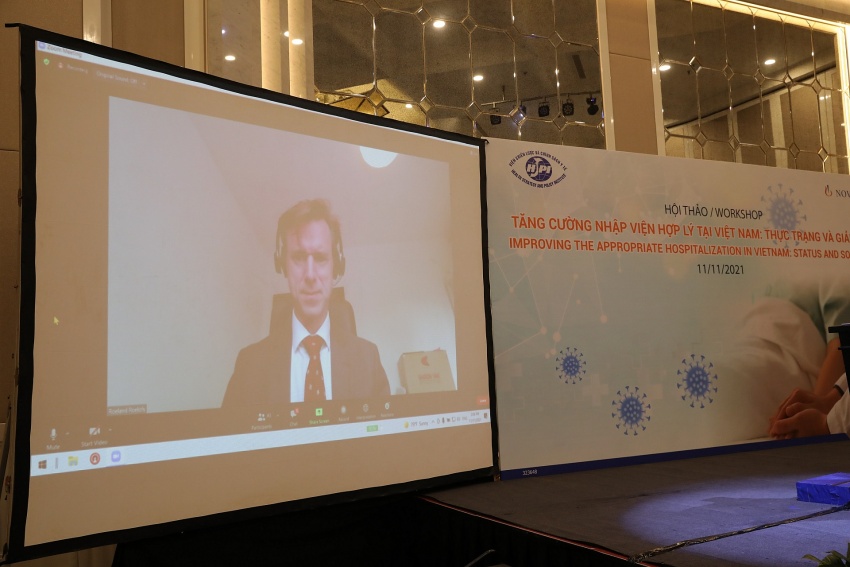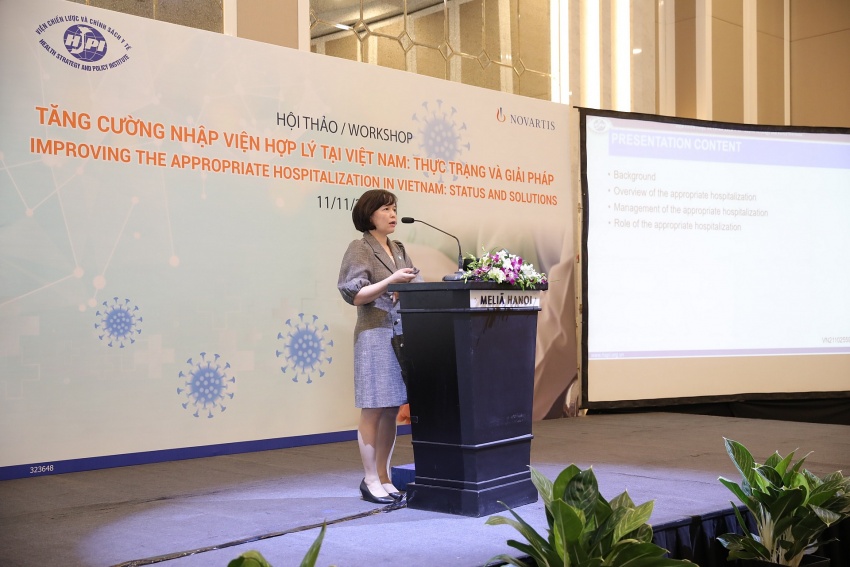Stakeholders discuss solutions to improve hospitalisation in Vietnam
 |
| HSPI cooperated with Novartis Vietnam to organize the workshop “Improving the appropriate hospitalization in Vietnam: Stautus and solutions” |
Themed “Improving the appropriate hospitalization in Vietnam: Status and solutions”, the event was an opportunity for attendants to get updates on international experiences in managing and improving appropriate hospitalisation as well as to share scientific research and discuss multi-dimensional solutions through coordination among stakeholders such as the Ministry of Health (MoH), HSPI, Vietnam Social Insurance, Vietnam National Heart Association, and Novartis.
The workshop also aims to achieve consensus about the need of improving appropriate hospitalisation to ensure the increase of universal healthcare, and the sustainable development of the health system to adapt flexibly to the new normal.
Speaking at the workshop, Assoc. Prof., PhD., Dr. Nguyen Ngoc Quang, deputy director of the National Heart Institute, discussed the status of heart failure as well as the current status of disease management in Vietnam, affirming that solving the re-hospitalisation cycle of heart failure patients would be an optimal solution to improve appropriate hospitalisation as it is one of the disease groups having the highest rate of hospitalisation.
The good news is that the new heart failure management model implemented in more than 40 hospitals is gradually proving the effectiveness of comprehensive management in reducing the rate of hospitalisation. Via applying the new treatment of ARNI (Angiotensin Receptor-Neprilysin Inhibitor), the cardiovascular death rate is reduced by up to 20 per cent, compared to routine treatment. Quang believed that creating favourable conditions for heart failure patients to access and use effective heart failure medications such as ARNI will help prevent patients from the spiral of hospitalisation – discharge – re-hospitalisation and the risk of mortality.
According to Ivo Sieber, Swiss Ambassador in Vietnam, the stress that the current pandemic puts on Vietnam’s healthcare system evidences the necessity to improve its efficiency and effectiveness. Today’s workshop is an excellent example of a comprehensive multi-stakeholder partnership to tackle this challenge.
During the event, stakeholders also discussed international experience on solutions to reduce avoidable hospitalisation for heart failure patients with multi-dimensional management mechanisms and solutions from developed countries such as advanced innovations, clinical expertise, health financing/ payment solutions, patient management, outpatient monitoring among others.
 |
| Roeland Roelofs, Global Cardio Metabolic head, Novartis Switzerland shared his international experiences on solutions to reduce avoidable hospitalisation for heart failure patients |
Roeland Roelofs, Global Cardio Metabolic head, Novartis Switzerland, offered some recommendations on approaches which can generate positive impacts on the objective of improving appropriate hospitalisation in Vietnam.
Dr. Nguyen Khanh Phuong, deputy director general, HSPI added that, “Inappropriate hospitalisation is avoidable with efficient and timely prevention and treatment solutions from the grassroots level. Strengthening appropriate hospitalisation not only helps the health system operates more effectively but also improves its endurance in the context of COVID-19.”
 |
| Dr. Nguyen Khanh Phuong, deputy director general, HSPI affirmed that inappropriate hospitalisation is avoidable with efficient and timely prevention and treatment solutions |
At the workshop, stakeholders agreed to propose some solutions to increase the appropriate hospitalisation in Vietnam. They include researching and developing a suitable set of hospital admission criteria to serve as an effective tool for hospitalisation management in Vietnam. Next is promoting the management of universal healthcare at the grassroots level as early detection, treatment and comprehensive management from the beginning help identify the right time for hospitalisation.
The other is expanding the management model of heart failure patients and applying IT to help manage more patients more comprehensively. And last is ensuring patients in general and those with chronic diseases in particular having access to appropriate drugs, including new drugs recommended in specialised guidelines like the ARNI group to help more patients access treatment, better control of complications, reduce the burden of hospitalisation treatment, and decrease patient mortality as well as burdens for the health system.
What the stars mean:
★ Poor ★ ★ Promising ★★★ Good ★★★★ Very good ★★★★★ Exceptional
 Tag:
Tag:
Themes: Healthcare Platform
- PM outlines new tasks for healthcare sector
- Opella and Long Chau join forces to enhance digestive and bone health
- Hanoi intensifies airport monitoring amid Nipah disease risks
- Cosmetics rules set for overhaul under draft decree
- Policy obstacles being addressed in drug licensing and renewal
Related Contents
Latest News
More News
- Hanoi intensifies airport monitoring amid Nipah disease risks (January 29, 2026 | 15:21)
- 14th National Party Congress wraps up with success (January 25, 2026 | 09:49)
- Congratulations from VFF Central Committee's int’l partners to 14th National Party Congress (January 25, 2026 | 09:46)
- List of newly-elected members of 14th Political Bureau announced (January 23, 2026 | 16:27)
- 14th Party Central Committee unanimously elects To Lam as General Secretary (January 23, 2026 | 16:22)
- List of members of 14th Party Central Committee announced (January 23, 2026 | 09:12)
- Highlights of fourth working day of 14th National Party Congress (January 23, 2026 | 09:06)
- Press provides timely, accurate coverage of 14th National Party Congress (January 22, 2026 | 09:49)
- Press release on second working day of 14th National Party Congress (January 22, 2026 | 09:19)
- Minister sets out key directions to promote intrinsic strength of Vietnamese culture (January 22, 2026 | 09:16)



























 Mobile Version
Mobile Version